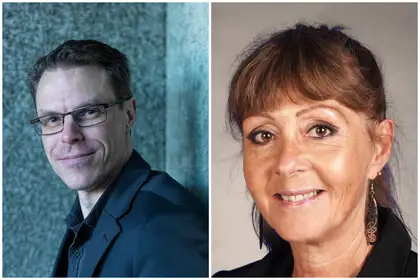
School of Fundamental Sciences Professor Murray Cox and Institute of Education Associate Professor Sonja Macfarlane, Ngāi Tahu, Ngāti Waewa are among the 23 new Ngā Ahurei hou a Te Apārangi Fellows.
The honour recognises exceptional contributions in research, scholarship or the advancement of knowledge at the highest international standards. Fellows can use the post-nominal ‘FRSNZ’ (Fellow of the Royal Society of New Zealand) after their name to indicate this honour.
The new Fellows will be formally inducted at a mixed mode in-person and online event in Whanganui-a-Tara Wellington on 28 April 2022.
Professor Murray Cox is one of the world’s foremost authorities on the genetics of Islands in South East Asia and the Pacific. Recognised internationally for driving major advances by developing inventive new analytical methods, he moves beyond the usual emphasis in molecular anthropology of tracing human movements to reveal the social and health implications of past contact and interaction.
His research leadership stems from coupling deep understanding of local communities with quantitative innovations spanning genetics, statistics and anthropology. His discoveries have captured global attention, with articles in The Economist and The New York Times, fellowships at the Max Planck Institute and Oxford University. The Royal Society Te Apārangi awarded him the Te Rangi Hīroa medal for his anthropological work to reconstruct processes of transformation and change in past societies using genetic data.
Professor Murray Cox says “I am very grateful for the support and efforts of my colleagues and students, which have made our research so successful."
Associate Professor Sonja Macfarlane is an influential scholar of Māori and Indigenous knowledge, with a particular focus on enhancing the social, cultural, educational and health outcomes achieved by Māori. Her reputation is characterised by promoting culturally responsive, evidence-based approaches in education and psychology, in order to reduce inequity and enhance the wellbeing and opportunities for Māori.
She has played a key role in the advancement of alternative ways for educators and psychologists to improve cultural awareness and responsivity, leading to the implementation of practices that accrue benefits for Māori learners (education) and clients (psychology). Her culturally-grounded publications and applied practice models in these disciplines have established her as an authority on the ways professionals can engage authentically within their professional spaces. With a commitment to building Māori capacity and capability, she is a highly sought-after doctoral supervisor and examiner of theses.
Dr Macfarlane says He mihi nūnui ki a koutou katoa. It is extremely humbling to have received this tohu from the Royal Society Te Apārangi.
“I need to acknowledge so many other amazing people who have been supporting and opening doors for me, over so many years. It has been, and continues to be, an absolute honour to be working in this space. Ko te aroha mutunga kore ki a koe toku whānau.”